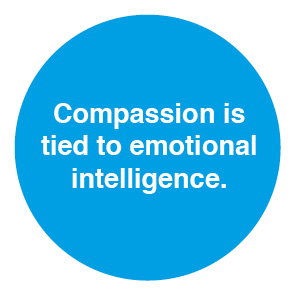
Epoch FIT
By Josh Axe
The quality of cultivating and expressing compassion is central to just about every religion on Earth, and it’s also a major focus in the field of psychology. Concepts like mindfulness and loving-kindness meditation have been steadily growing in popularity for several decades, and today a large body of evidence supports the beliefthat compassion has benefits related to both mental and physical health.
But despite what you might think about compassion, it’s not merely about just being nicer or more agreeable.
Compassion doesn’t require that you agree with everyone you engage with; rather, compassion means showing up more honestly, being more present and unplugged from distractions, and remaining open to feedback and really listening.
A 2015 article published in the Harvard Business Review called compassion “a better managerial tactic than toughness.” And in a 2014 episode of TED Radio Hour on National Public Radio, an expert on emotional intelligence spoke about the importance of cultivating more compassion specifically for things like developing more honesty in relationships and even becoming more productive at work.
One expert in the TED Radio Hour episode “Just a Little Nicer” related compassion to the idea of “emotional correctness,” or acting emotionally appropriate toward others. Compassion is tied to emotional intelligence/correctness because it brings attention to the tone and body language we use when speaking with others, how we show respect and handle feedback or criticism, and the way we make others feel when they're being vulnerable around us.
Those who make an effort to purposefully act more compassionately tend to have stronger relationships, feel happier and more confident, experience better moods, maintain a healthier lifestyle, and bounce back from adversity more effectively.
Regardless of where you may fall on the compassion versus judgment/criticism spectrum right now, you can develop more compassion. Research suggests that mindfulness interventions, particularly those with an added loving-kindness component, have strong potential to increase both compassion toward others in need, as well as compassion for oneself.
Through practices like meditation, engaging in perspective-taking, opening up about your insecurities, and volunteering to help others, you may notice a serious increase in positive emotions and your quality of life.
One definition of compassion, according to the Oxford Dictionary, is “sympathetic pity and concern for the sufferings or misfortunes of others.” What exactly does it mean to be more compassionate? Other ways we commonly describe compassion include showing empathy, sympathy, care, concern, sensitivity, warmth, or simply love. What would the opposite of compassion look like? Indifference, cruelty, and harsh criticism.
Some compassion experts describe being compassionate as “suffering along with.” This can mean suffering along with another person or even with yourself in the case of self-compassion. In other words, it means stopping judgment and resisting the act of labeling people (including ourselves) as either “good” or “bad.” Compassion simply means accepting with an open, kind heart and recognizing that everyone has strengths and weaknesses.
Compassion has been shown to increase behaviors related to care-giving, including touch, non-threatening postures, and vocalization of feelings. Biologists believe we are all born with compassion.

Much of the debate regarding the need for increased compassion has to do with concerns about whether living in the digital age may be affecting our ability to be empathetic, vulnerable with others, and nonjudgmental.
Researchers are now digging into the important questions regarding the relationship between our levels of happiness and our use of social platforms that require less face to face time. We’re left wondering if it’s possible that these convenient, omnipresent forms of digital communication may be greatly stifling our compassion and well-being.
Experts believe there are several reasons why digital communication and social media use may lower compassion and positive feelings: They increase comparison among social classes, make it harder to understand feedback accurately, and distort our accomplishments, priorities, and values.
PASCAL LE SEGRETAIN/GETTY IMAGES

For example, the use of social media makes it easy to compare our accom-plishments to the successes of others and to feel like we aren't doing things right. And when we can’t use body language and tone to communicate via text or email, we may more easily misunderstand others, or be harsh or bold when communicating.
Meanwhile, the more that we can work, shop, and carry on all from the comfort of home without actually interacting with others face to face, the worse these problems may get.
It might seem like being hard on ourselves would be a good way to motivate us to change for the better, but research actually suggests the opposite is true.
If we’re in a difficult or stressful situation, we rarely take the time to step back and recognize how hard it is to be in that moment. Instead, we may turn toward beating ourselves up, denying the problem exists altogether, blaming others, or just feeling hopeless.
Dr. Kristin Neff, one of the leading experts on self-compassion, said that “one of the downsides of living in a culture that stresses the ethic of independence and individual achievement is that if we don’t continually reach our ideal goals, we feel that we only have ourselves to blame.” Dealing with societal pressures can cause some people to experience depressive bouts during hard times, or to develop signs of narcissism when they aren’t able to take responsibility for failures.
Practicing self-compassion means letting go of unrealistic expectations and the urge for perfection that makes us feel insecure and dissatisfied. Instead, it opens the door to real and lasting satisfaction, along with more honesty and appreciation.
By giving ourselves unconditional kindness while embracing difficulties and disappointments, we avoid destructive patterns of fear, negativity, and isolation. Self-compassion also tends to increase positive mind-states that are beneficial for those around us, such as satisfaction and optimism, while reducing stress levels.
Dr. Josh Axe is a doctor of natural medicine, a clinical nutritionist, and an author with a passion to help people get well using food as medicine. He recently authored “Eat Dirt” and “The Gut Repair Cookbook,” and he operates one of the world’s largest natural health websites at DrAxe.com
